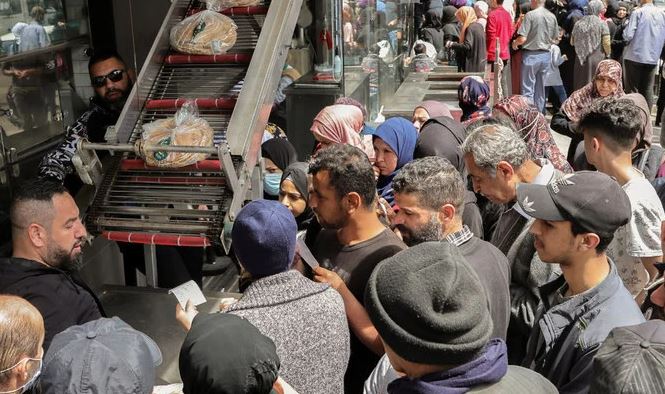BEIRUT: EU member states’ ambassadors to Lebanon on Tuesday told President Michel Aoun of their “grave and growing concerns” over the deepening economic crisis in the country.
During a meeting with Aoun, the EU’s envoy to Lebanon, Ralph Tarraf, urged the Lebanese leader to immediately implement the reforms needed to resolve the situation.
In a tweet, Tarraf said: “Today, we, the ambassadors of the EU and its member states resident in Beirut, along with the ambassadors of Switzerland and Norway, met with President Aoun to express our grave and growing concern about the current situation in Lebanon.
“We urged the president to do his utmost to support and actively contribute to the implementation of the crucial economic, monetary, and fiscal reforms that Lebanon has committed to.
“Though Lebanon’s context is challenging, immediate measures … need to be implemented. The time to act is now. The EU and its member states remain ready to support Lebanon in this critical period, politically and financially, in the context of implementing a sound economic recovery plan and an IMF (International Monetary Fund) program,” he added.
On Monday, Aoun and his political team had reiterated their rejection of Prime Minister Najib Mikati’s caretaker government taking over the country’s administration in the event of a presidential vacuum because they believed the government to be illegitimate.
Aoun’s office noted that the president had assured the EU ambassadors that he was working on forming a legitimate government that could assume the powers of the president in such an event and was doing all he could to implement economic reforms.
Meanwhile, the Saudi ambassador to Lebanon, Walid Bukhari, has held a series of meetings with Lebanese politicians over recent days. He said: “Saudi Arabia is keen on maintaining Lebanese stability and adhering to the Taif Agreement (reached in 1989 to provide the basis for the ending of the civil war and return to political normalcy in Lebanon) and the Lebanese constitution.”
On Monday, he held talks with the head of the Progressive Socialist Party Walid Jumblatt and on Tuesday met the leader of the Lebanese Forces party Samir Geagea as part of a political tour ahead of the presidential elections.
Jumblatt said: “We discussed many issues; but Bukhari stressed the Kingdom’s historic keenness on Lebanese stability, the Taif Agreement, and the constitution, and that we, the Lebanese, respect constitutional deadlines and elect a president.”
Geagea said: “We discussed local and regional issues but focused on the Lebanese crisis and talked about the upcoming elections.
“I learned that Saudi Arabia has prepared large aid packages for Lebanon, which require us to have a president, a prime minister, and a government that can be trustworthy, since the Kingdom is unwilling to deal with any Lebanese official involved in financial or political corruption,” he added.
A source in Dar Al-Fatwa told Arab News that the spiritual authority for the Sunni community in Lebanon would be holding a meeting for Sunni MPs on Saturday. Of the 27 in parliament, two had so far declined the invitation, reformist Halime Kaakour and independent Osama Saad.
“This will be the first meeting that brings together Sunni MPs of various political orientations since their victory in the parliamentary elections in May,” the source said.
On Tuesday, the Lebanese pound reached a record low. Banks closed for the second day in a row while the price of goods, especially fuel.
A delegation led by Ernesto Ramirez-Rigo, the IMF’s head of mission for the Middle East, met with Parliament Speaker Nabih Berri, whose media office said that they discussed the stages of the dialogue between Lebanon and the IMF and the legislation implemented by parliament.
“Parliament is determined to intensify its work to accomplish what is required of it in terms of reform legislation, and to cooperate with the executive authority in this regard and preserve the rights of depositors,” Berri told the delegation.
After his meeting with the IMF delegation, caretaker Economy Minister Amin Salam said: “We discussed the reform laws requested by the IMF, specifically the capital control law, banking secrecy law, bank restructuring law, and the 2022 budget.
“The IMF carries a very clear message, which is the urgency in approving these laws; otherwise, we will not be able to move forward to reach a final agreement with the fund.”
Salam told the Associated Press that Lebanon hoped to adopt key reforms demanded by the IMF for a long-delayed but urgently needed bailout before the end of next month if there was a “political will.”
He added: “The IMF and the World Bank believe that Lebanon needs special care to achieve food security, and we will address, during the annual meeting of the World Bank, the need to support Lebanon in the field of food security.”

